Issue Number 4, June/July 2009
Contents
- Abundance by Judith Montgomery
- Dodo by Francis Raven
- During the Power Outage by Jeanne Wagner
- In the Meadow by Grace Cavalieri
- Little Fires by Christina Lovin
- Now Spring by Alicia Ostriker
- Saturday Snow Dec. 10-09 by Michael Lee Johnson
- Seed of Greatness by Charles Ries
- This Part of Texas by Gary Cooke
- Toilet Tissue from Recycled Paper by Joan Reinhardt Reiss
- What Follows by Becky Faust
- You Could Save on a New Sky! by Lois Marie Harrod
Archives: by Issue | by Author Name
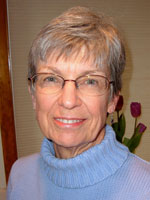
Abundance
by Judith Montgomery

Bog-waters brim in gleam, in new-
green curl and shoot under pouring
sun—season for the skunk cabbage,
most unlovely name, to push through
winter scurf—broken twigs, scuffed whisks
of pine storm-shaken loose, a deer’s
black pebbled scat snowmelt-softened
to dark jam. The stalk thrusts vivid
yellowgreen, blunt thumb that presses
spongy breeze—sleek leaf-envelope
a swell in mid-spathe just below
the closed, delicately curving
tip. Warblers slip and soar above,
wings dipped and crowned in butter,
as the close-folded spathe ripens
lemon—and begins to split, clasped
palm curving open to reveal
the knobby dotted swiss of spadix
all strut and beam, its mirror-print
kissed deep in cupping tissue. Now,
stalk and spadix cast their spell:
a certain pungence, a summons
that enriches bursting buds, lifts
the cloud of swifts that stitches pond
to sky, and daubs one upturned feather
whitely drifting on a ripple. Now,
everywhere’s quick-flutter, water-
flicker, sun-glance—atoms float
on odor, sex beckons to the dance:
ready, ripe—all beauty releasing.
Originally published in The Comstock Review, 2006
© Judith Montgomery
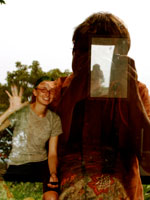
Dodo
by Francis Raven

My mother once made a Christmas card with a picture of a dodo.
She was the wife of the director of a cultural institution.
He was my father, not the flightless one, but the director.
The dodo was an example, I remember. She wrote a paragraph about it.
I guess she was proud of it. She shows it to me sometimes
Although that was a long time ago and they are divorced.
She is no longer the wife of the director of a cultural institution.
Fossil Array: Recent.
That was when people starting talking about biodiversity.
We were talking about it first, about what people could do.
The amazing thing is that there are drawings,
Like we have drawings, of that fool bird, accurate drawings
Of an entire species (regardless of the philosophical problems
Regarding the boundaries of natural kinds) that no longer exists
Just like I have memories, memories like I have now,
Of my parents’ marriage. Aren’t I important? Isn’t that bird important?
I don’t know when one stupid bird
Or one stupid marriage becomes important
Except to say some things live in our neighborhood
And we care about them. Although related to pigeons
Those rats of the sky, with tough meat, their flightlessness
Made a perfect headdress: a perfect recipe for extinction (17th century):
Hunting + fearlessness + flightlessness + invasive animals (dogs, pigs, cats, rats) =
Anything can be killed, anything in your neighborhood.
© Francis Raven
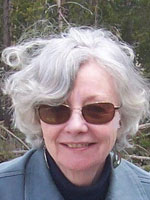
During the Power Outage
by Jeanne Wagner
Jeanne lives on the east side of San Francisco Bay with Cerrito Creek, and the canyon it forms, in her "backyard," where black-tailed deer, turkey vultures and a dwindling population of raccoon and possum still roam.

We bent in close to the candles,
the firelight,
our heads inclining over the page,
then lifting up,
as if in ritual prayer.
We were more restless in the semi-dark,
more calm,
as if the world of our rooms could
contain us,
we its dark continents, husbanding
each flame
as if there were a new kind of coldness,
a new kind of heat.
© Jeanne Wagner
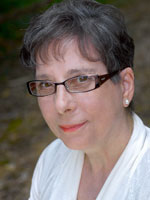
In the Meadow
by Grace Cavalieri
Grace lives and writes in Annapolis, Maryland, by the beautiful Chesapeake Bay, which is coming back to life with new fish, new hope, new streams.

Upon the half imagined branch, clouds seeping in wait
spirits slip like rain toward imagination, its center,
fruit falls from drifting light bewitched to sound, breath
of tiny gales unfurled, music is in the meadow harvesting
mercies. Information from the heart transforms to words,
weave them to garlands like tides their distance, surviving
the sun, in the meadow, a stream from silence, a field
of blue flowers, a chill of change.
© Grace Cavalieri

Little Fires
by Christina Lovin

I.
There are witnesses. There were plans:
Bats would be eased into cold sleep
deep in the bellies of bombers,
strapped with incendiary explosives
the size and shape of their young,
so as not to alarm, but rather, when warmed
and wakened, encourage their swift flights
to safety beneath the eaves of paper houses,
balsa wood shops, and flammable factories.
So, when their time was up, the bombs
would set off a holocaust of small blazes
across Japan. That was the plan,
and in the trials a million little fires
burst, flamed, then cooled to carbon.
But Praise the Lord and Pass the Ammunition:
the A-bomb came along to "save more lives."
II.
Sometimes the Lord moves in mysterious ways
his wonders to perform. Sometimes He gives.
Sometimes He takes. Sometimes He leaves
the job to his followers. Let him who is without sin
throw the first hammer blow and drive the first nail
to close over the only opening they know: high above
the stained-glass Jesus with his white lambs and benevolence.
Let him who knows the mind of God climb up
to detonate the poison bombs, drop them inside,
and set the final nail. Come ye who love the Lord
and let your joy, and let your joy be known
at the screams of the beasts, damned to asphyxiation
because one was lost but now is found, cold and dead,
in the children's Sunday school room, to demonstrate
like a Bible story flannel board how being where one
should not be brings destruction on all one's kind.
Let the faithful stand and be counted like every sparrow
and each numbered hair on each small brown face
pressed against the screen, then falling, falling out of sight,
layer upon layer--two hundred bats or more--snuffed,
then shoveled out, bagged, and dragged to the incinerator.
Let there be a witness. Let it be me. I was the pastor's good wife,
who was not good, who did not speak up, who did not speak out.
Here, I give testimony to their pleading and clawing,
their helpless young clinging, naked and pink,
to their soft undersides. Thirty years, now, and still I weep.
How is it that a true soldier ever sleeps soundly again
with what was nailed over and boarded up,
what was left inside to die? Blessed be the cursed.
And pitied be the bats: feared because they are not beauty,
hated because they subsist on what we detest, what we don't want
anyway, dispensable because they are legion and strange
and do not sing or show bright colors, but are dark
and seek the deeper darkness for their rounds of necessary mercy.
III.
Ghostly in the headlights' glare, chickweed and foxtail
crowd this moonless lane that digs like half-formed memory
between forgetful hills. A bat, two, drop into sight
then shoot straight up like quicksilver moths
beyond the limits of the beams. Another dives
and flies directly at my windshield, but rises sharply
as ash from a wind-killed ember. Mysterious color
of nothing special, a possum ambles in his graceless,
four-handed way along this familiar curve. He disappears
into cinereal straw at the side of the road, pausing
to glance back just once, his eyes black as accusations.
from Little Fires, Finishing Line Press, 2008
© Christina Lovin
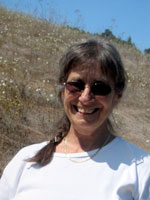
Now Spring
by Alicia Ostriker
Alicia lives in Manhattan Valley, formed by an east-west slash in the granite bedrock that goes downhill from Central Park west to the Hudson River. A stream once flowed down it; now wind from the river funnels up.

Now spring cries out again, I'm here, I'm here
until tulips roar like lions, daffodils scream like witches,
robins puff their chests out, sumptuous maples shout
for a wind to come over and wrestle, but as for us
we belong to the species that thinks it can change the laws
we are the ones that trample and soar and bulldoze
what interferes--she wipes mud from her brow, I'm here
in my beauteous majesty, but we are a little terrified
just half recalling how once we welcomed her
Now her excitement subsides
Now her excitement subsides like a mirage
a winged stillness underneath the shrieks
of children out of school is almost audible
and I too seem to have achieve tranquility
as i walk along ringing a bell of silence
each blooming shrub on a lawn, each wildflower
by the road—the lipsticked azalea, the brass daylily--
seems to offer itself: Aren’t you Whitman’s daughter?
Please look at me, please love me
Still a few
Still a few glorious flying amber leaves
but the dark is rising
the grass withered the cones broken
if we think of the countless seeds
wasted by every tree every year
the way each life produces so much death
is a sort of agony and still each seed
down in the dirt is gambling or voting
hoping dear November for the best
© Alicia Ostriker
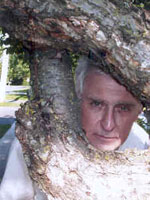
Saturday Snow Dec. 10-09
by Michael Lee Johnson

Snow, snow, more snow
on Saturday morning --
doves mount my birdfeeder
full of bright golden corn−
on the wooden balcony they
leave love notes tucked
down at the foot
of my sliding glass doors.
© Michael Lee Johnson

Seed of Greatness
by Charles Ries

Some thought of him as a throw back to the Cretaceous
Period, a yellow belly bottom dweller who, in the midst
of spring’s spawning season, could leap like a porpoise.
We tagged him in Lake Winnebago in 1978 and named
him Mike. He swam down the Fox River, over 14 dams
and locks and into the Great Lakes. Mike was to sturgeons
what Christopher Columbus was to Italy: the outsider,
astronaut, citizen philosopher who followed his own stream.
Washing up on Sandusky Bay in Lake Erie, Mike was
Found ignominiously dead on arrival in the grip of a
commercial fishing net. Wisconsin/Ohio wildlife authorities
concluded his death was the result of spawning stress.
He had lived 100 years. Mike had wandered nearly 400 miles as the
crow flies from a lake his species was never known to leave.
God bless fish like Mike, or men like Mike, or reptiles
like Mike. For out of the million aberrant matings and
progeny they produce, a few mutant seeds grow wilder
than the rest, seeds that carry the promise of leading a
flock, a school, or a race out of its pond and
into a vast uncharted sea.
Originally published in the Milwaukee Journal Sentinel, 2/7/03
© Charles Ries
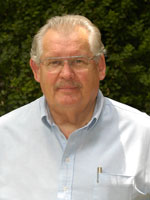
This Part of Texas
by Gary Cooke
Gary lives at the edge of the Texas Hill Country in the Lower Colorado-Cummins Watershed near Gilleland Creek.

Squalor is a plastic bag
shredding in the thorns
of a wire fence, trees
blown bare by winter.
In this part of Texas
winter is a whiskery thing,
the face of an old cowboy
too long in the hard light.
You can see the pain
of dry earth, the way cows
kick dust as they search
the barren fields for grass.
In the dirt yards
dogs watch trucks go by
while grey sheds lean
and play sets stand empty.
You wonder what a woman thinks
as she stands, her hair blowing,
arms folded beneath her breasts,
lips as thin as the horizon.
She turns and climbs
the trailer stairs in her blue dress,
the whole sky pressing down
and no way to change the wind.
Originally Published in Borderlands - Spring/Summer 2007
© Gary Cooke
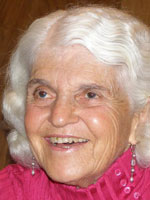
Toilet Tissue from Recycled Paper
by Joan Reinhardt Reiss

In the 1990s, as the California Director for the Wilderness Society, many days were spent protecting forests. I never worried about toilet paper--- a big mistake. Thanks to multi-million dollar advertising campaigns by paper giants like Kimberly Clark, Americans demand the softest toilet paper possible. Yet, the softest toilet paper comes from cutting real trees and causing major deforestation.
Welcome to the great toilet paper debates. According to the Natural Resources Defense Council, (NRDC), deforestation is the single greatest cause of global warming and toilet tissue is responsible for 15% of all deforestation. Loss of trees results in enormous devastation to entire forest ecosystems. NRDC estimates that on a world-wide basis, deforestation causes more global warming than the combined emissions of all vehicles, airplanes, and ships —and that’s not all. When trees become paper, more water is required than converting recycled paper to fiber. Many companies that use tree pulp also employ chlorine-based bleach which pollutes water systems.
The United States is the largest consumer of toilet paper in the entire world yet only 2% of our toilet paper purchases are from recycled fibers according to Information Resources Incorporated, a marketing research firm. Consider the San Francisco Bay Area, a green epicenter of the universe where high use of recycled toilet paper might be expected. It’s a disgrace that annual sales figures show that only 1% of Bay area toilet tissue is recycled. In Europe and Latin America, recycled materials constitute about 20% of all toilet tissue sales. Shame on us!
NRDC is consulting with some trend-setting clients like Major League baseball to use only recycled toilet tissue. During the Academy Awards ceremony we were all dazzled by the gowns, jewels, and sparkle from the star power. Only NRDC knew that all the toilet paper in the Kodak Theater restrooms was 100% recycled.
Companies like Georgia Pacific and Kimberly Clark promote the softness of their tree-based toilet tissue. Fortunately other comparably priced choices exist. Seventh Generation, a Vermont based company makes a host of environmentally responsible products including recycled toilet paper. Marcal corporation recently began a major campaign on their recycled paper products with the acronym “Small Steps.” These actions just might move the recycled market ahead.
As the major players in this environmental monopoly game, we can make change by talking with our wallets. When sales of all recycled paper products start to take off, every company will want a piece of the action. Much depends on how loud we talk.
Shopping for environmentally sound paper products is simple. Look for paper goods that are 100% recycled with a high percentage of post-consumer content— a reference to the waste paper that we place in our recycle bins. The best paper products state that no chlorine bleaches were used in the manufacturing process. Chlorinated chemicals are toxic and cause pollution of water systems. Hydrogen peroxide is one of the best products to bleach paper because this chemical breaks down to water and oxygen.
If you doubt your toilet paper and other paper goods, consult the Greenpeace website which grades a host of recycled paper products. Search for the “Recycled Tissue and Toilet Paper Guide” which is printable. Greenpeace calculates that if each American family bought a roll of recycled toilet paper just once, 400,000 trees could be saved. Recycled toilet tissue is about the same price as rolls that destroy the forest. Surely a slight decrease in toilet tissue softness is worth saving forests, decreasing global warming and leaving our children a better planet.
© Joan Reinhardt Reiss

What Follows
by Becky Faust

If a tree falls and no one hears
then it didn’t fall, you’d say, but
I say the tree would know,
and so would the hive-world
that had hummed and teemed
in its branches. And the blossoms
would know, each sticky stamen
barren of pollen. Okay you say,
then think of a fallen rock
I didn’t hear. But I can see
earth’s new crater, blades
of grass bent, dust disturbed;
each perturbed molecule
knows that rock fell. Okay,
but not in my reality,
you’d say if I didn’t hear
or see it. But I tell you
my reality is as wide
and yearning as water,
so that strip mine waste
dumped into a stream
wafts its effluent plume
through estuary and ocean
that connect endless land
touching land I walk through,
air I breathe in. I never even
licked that apple,
but my heel still stings.
With original sin,
it only begins.
© Becky Faust
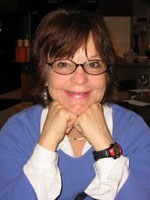
You Could Save on a New Sky!
by Lois Marie Harrod
Lois lives in the Stony Brook watershed in Hopewell, New Jersey, a sweet little town that has been here since the l8th century. Though close geographically, it seems far from the turnpike-oil-refinery New Jersey.

Internet car ad
At the lot where Skies are cheap.
I see a cute little Indigo in the last row
but the salesman tells me
the Azure’s bigger, safer.
With two children
you want protection.
So how many clouds per hour
can count on?–I try to sound
wise to his pitch–how much
thunder under the hood?
He gets out the specs.
One bolt of lightning from this baby
can toast
160,000 slabs of bread.
I don’t eat that many carbs,
I say, but it might be handy on long trips.
Oh, especially at night, he says,
when there is no moon.
I am concerned about emissions.
Any of these Skies a hybrid?
He looks confused. You know, I say
a Sky like a nectarine—half peach, half plum.
Oh, you mean the Sunset Sky—
we have lots of those with all the smog.
© Lois Marie Harrod